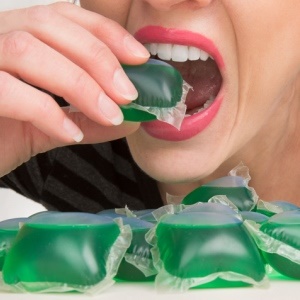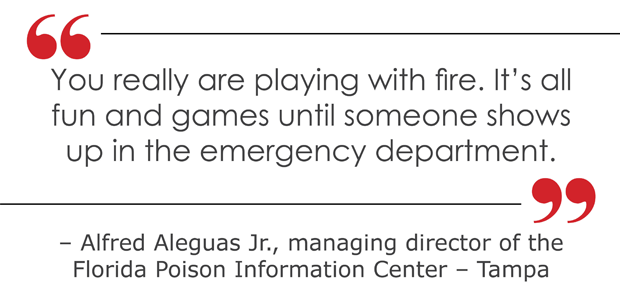
You've gotta be kidding me. That's gotta be fake.
That's the understandable first reaction of many to the viral phenomenon dubbed the "Tide Pod Challenge".
Sad to say, it's real.
A social media meme
Prompted by internet dares, dozens of US teenagers in recent weeks have popped liquid laundry detergent packets from a variety of manufacturers into their mouths just to see what happens, according to the American Association of Poison Control Centers (AAPCC).
There have been 39 reported cases of teens intentionally ingesting laundry pods during the first 15 days of 2018, poison control centre statistics show.
That's exactly as many cases reported for the entire year of 2016, and nearly three-quarters of the 53 intentional misuse cases reported to poison control in 2017, the AAPCC said.
"It's one of those things that seem to have taken on a life of their own, once it became a social media meme," said Alfred Aleguas Jr., managing director of the Florida Poison Information Center-Tampa. "Frankly, it's a little crazy."
The plastic skins of laundry pods are designed to dissolve on contact with water and automatically release the pods' contents.
Detergents contain harmful chemicals
That means when kids pop a pod in their mouths, they're very likely going to receive a flooded snootful of chemical cleansers.
"It is important to remember that these products are highly concentrated detergent packets. Their contents can cause serious harm if they are ingested or come into contact with the eyes or skin," said the American Cleaning Institute, a trade industry group. "They are not a toy and should not be used in pranks. Product safety is not a joke."
Dr Alfred Sacchetti, chief of emergency medicine at Our Lady of Lourdes Medical Center in Camden, New Jersey, noted that "any detergent is to some extent a caustic. It can burn you."
A previous Health24 article reports that most commercial laundry detergents contain harmful chemicals, but that you can still get a clean wash by using less detergent, choosing low-toxicity brands, or making your own.
Scarring from severe burns to the aesophagus could create a long-term choking hazard for a teen, Dr Sacchetti explained.
"Now the opening from your mouth to your stomach has been narrowed. Food gets stuck. If you try and eat a hot dog, it gets stuck," Sacchetti said.
A number of deaths
Kids could require a food tube implanted into their stomach to keep them nourished while they undergo multiple surgeries to repair the throat damage, he added.
At the very least, kids who stick a pod in their mouth will cough, gag and foam at the mouth. At worst, they could experience diarrhoea and vomiting, chemical burns to their throat and airways, severe breathing problems, seizures and even a coma, poison control experts said.
"We've even had some deaths" in years past, Aleguas said. "There's something about these single-load liquid laundry packets that make them more toxic."
When laundry pods first hit the market several years ago, experts were particularly concerned about young children trying to eat them. The pods are very colourful and look like candy.
Indeed, children aged five and under were far and away most affected by intentional and unintentional exposure to single-load liquid laundry packets in 2017, accounting for 10 583 of the total 12 299 cases reported to the nation's poison control centres.
Not fun and games
As a result, most messages about laundry pods have focused on warning parents to keep them out of the hands of young children. Poison centres even have gone so far as to recommend that parents with kids five and under not use the pods at all, Aleguas said.
"I thought we were getting a pretty good handle on it in our paediatric population," Aleguas said. "I'd never expected this from older children, honestly."
Putting the pods in a locked cabinet won't help with teenagers, since they can just hit the supermarket and buy their own if they're determined to pull this stunt, Aleguas said.
"Parents should sit down and talk with their teens and say, 'Yes, it seems funny and we know it's going around on social media, but it really has the potential to produce some very severe symptoms,'" Aleguas said. "You really are playing with fire. It's all fun and games until someone shows up in the emergency department."
South African teens are urged not to take part in these or similar "games".
If you suspect your child has ingested a poisonous substance, contact the Poisons Information Helpline of the Western Cape on 0861 555 777. You can also phone the Nationwide Emergency Response at 10111 (landline) or 112 (cellphone) who will route you to the emergency service closest to you.
Image credit: iStock




 Publications
Publications
 Partners
Partners











